Antonio Pietrangeli’s I Knew Her Well (1965): Criterion Blu-ray review
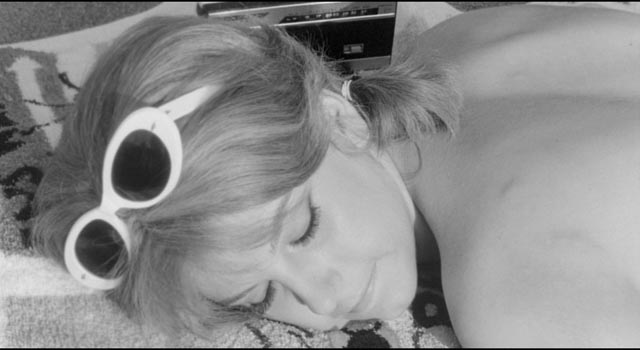
Although Antonio Pietrangeli is less well-known than his contemporaries, his involvement in Italian film spanned from the beginnings of Neo-realism through the ’50s and ’60s, as that movement evolved intellectually into the brilliant dissection of the post-war economic recovery and the social and political consequences which resulted from prosperity and a rejection of traditional social norms. As a writer, Pietrangeli collaborated with Visconti (Ossessione, 1943; La terra trema, 1948) and Rosselini (Europa ’51, 1952; Viaggio in Italia, 1954) among others. As the latter films indicate, a signature characteristic of Pietrangeli’s work turns out to be an interest in and concern for women’s experience in those transitional decades.
I personally had not heard of this filmmaker before the release of his 1960 film Adua e le compagne on DVD a few years ago. That film was a revelation, the work of an observer as acute as Antonioni or Fellini, but without the intellectual gloss of the former or the flamboyant style of the latter. In a sense, it remained closer to the principles of Neo-realism than the more modernist work of those directors, but what really gave it distinction was the intense focus on women’s lives. The story of a group of former prostitutes, displaced by newly enacted laws which closed the brothels where they had worked, it painted a strong and nuanced portrait of friendships constrained and at times broken by social attitudes which refused to allow these women independent agency. As they struggle to create a business to support themselves (a country restaurant), the men around them – former clients, political authorities, the police – continually force them back into their former identity as prostitutes, regardless of who they are and are capable of becoming.
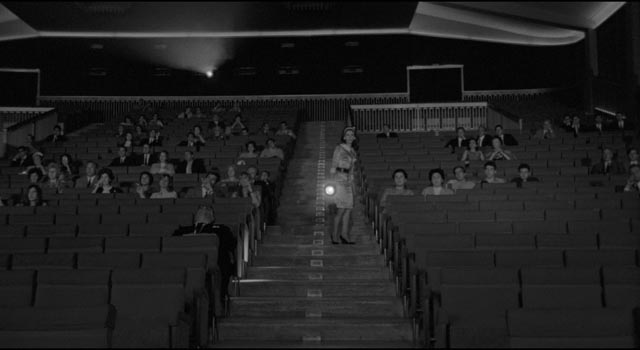
This theme is central to the film generally regarded as his masterpiece, now given a release on Blu-ray by Criterion. I Knew Her Well (Io la conoscevo bene, 1965) again focuses on the experiences of a woman, Adriana (Stefania Sandrelli), in this case bridging the gap between Italy’s past and present, a gap which opens up possibilities for redefinition, while at the same time stripping away traditional supports. The film also bridges the gap between Neo-realism and modernism, the former represented by an interlude during which Adriana returns home to visit her parents who live a harsh life on the land – a quiet, seemingly alcoholic father, a bitter and angry mother, and a younger brother. Here she is berated by her mother for leaving them, while at the same time the older woman admits the hopelessness of their lives.
Adriana left this place in search of something new and better in Rome. She aspires to become an actress, in the meantime working at a number of jobs – in a salon, as an usher in a movie theatre, as a model. Pietrangeli establishes a strong metaphor for her existence with the film’s opening shot; under the credits we see a very long pan across a garbage-strewn beach, finally coming to rest on Adriana tanning on a towel among the litter. This first view of her presents her as an erotic object, a young, almost naked body in contrast to a grubby, unglamourous setting. Pietrangeli’s overriding strategy is to continually present Adriana from the outside, as an image of surfaces which prevent access to her inner life. This is how she is seen by the people around her, as a sexual object to be exploited and used.
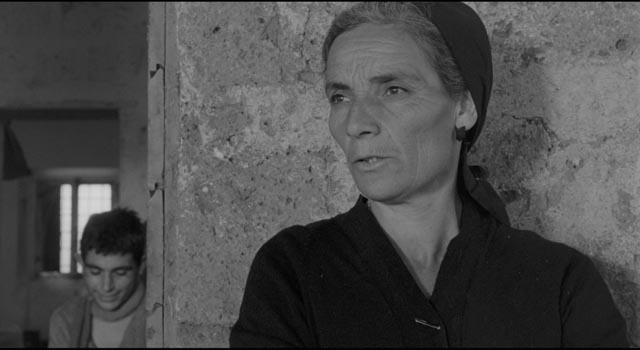
The film progresses through a series of discrete episodes which initially give the impression of a shallow, promiscuous young women. Only gradually do we come to see that the supposed naivete of the country girl is actually an expression of emotional openness and trust as much as a pursuit of pleasure. But that openness and trust is what exposes her to exploitation; it encourages men to take advantage, to see her as an object of their own pleasure.
Somewhere around the film’s midpoint, this matter is directly addressed in a scene in a writer’s apartment where she lounges on the bed after sex. In the man’s typewriter, a page describes a woman named Milena – when she queries the writer about the character, he says “Trouble is, she likes everything. She’s always happy. She desires nothing, envies no one, is curious about nothing … Yesterday and tomorrow don’t exist for her. Even living for today would mean too much planning, so she lives for the moment.” Adriana asks “Is that what I’m like? Some sort of dimwit?” This writer, like the other men she encounters, doesn’t see beneath the surface because he has no need to; her openness already gives these men access to what they want.
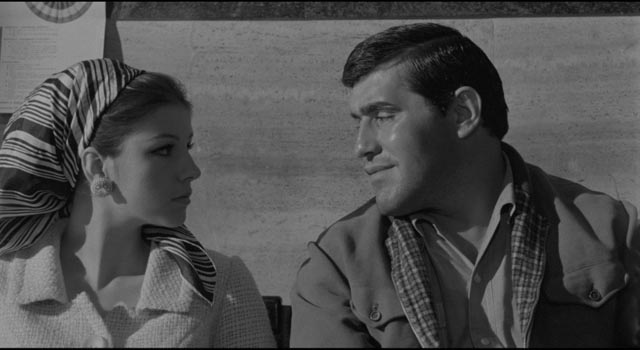
As charming as Adriana remains throughout these encounters, the gradual accumulation of humiliations and ill-concealed contempt directed at her wear away at her sense of self. Her ambitions are revealed as superficial – at a party, she witnesses the humiliation of an ageing actor (Ugo Tognazzi) who is desperately trying to win a small part in some new movie. He is forced to put himself on display for the amusement of the party guests. At the same party, Adriana is granted a brief interview by a newsreel reporter, who concocts a brief “portrait of a new face” which she sees in the theatre where she once worked, surrounded by her former co-workers. It has been edited in the cruelest way imaginable to mock her naive ambition.
The men around her – her rather sleazy would-be agent, the ageing actor at the party – try to pimp her out for their own benefit, to gain favours by trafficking her to others whose influence they think they can benefit from. This world, stripped of its past structures and rules, is morally bankrupt even as it enjoys an economic boom. It’s the same world Fellini depicted in La Dolce Vita, but here seen not from the perspective of a jaded man, but rather from the point of view of a powerless woman who has mistakenly assumed that she too can benefit from the boom. But the film in no way assumes that the old world was somehow better, either physically or morally, which is the point of the scene in which she goes home to visit her family.
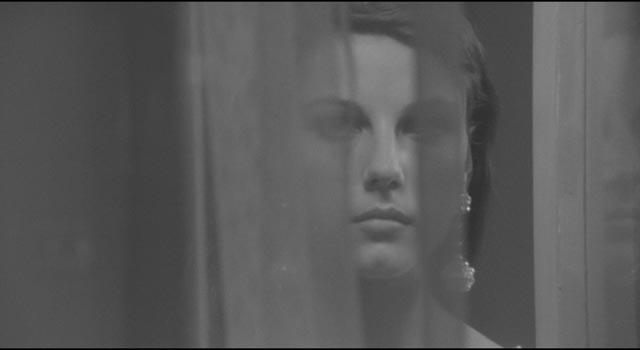
As much as Adriana enjoys a sense of opportunity and freedom in the first half of the film, the progressive closing off of that promise in the second half subtly moves the story from what at first seems like a comedy of manners towards an increasingly dark place. While the ending, coming so abruptly, at first seems somewhat arbitrary, in retrospect the groundwork has been carefully laid; we have perhaps simply not been aware of what was coming because Pietrangeli steadfastly maintains his strategy of avoiding access to Adriana’s inner life. The film’s title is revealed as deeply ironic as we realize the impossibility of knowing Adriana at all, let alone “well”. We, like those around her, have been projecting our own feelings onto her, based on our interpretations of her behaviour. That we ultimately come to question the inadequacy of those interpretations is a tribute to Pietrangeli’s skills as a filmmaker, but also – and crucially – dependent on the remarkable performance of 19-year-old Stefania Sandrelli. It takes real skill to portray a character who seems so naive and superficial while finally suggesting the deep wounds that the world has inflicted on her.
The disk
Criterion’s Blu-ray presents a new 4K restoration of the original negative and a fine-grain 35mm positive created by the Cineteca di Bologna. The image has strong contrast and a full range of grays, with a nicely textured film look. The restored mono sound, although post-synced as is typical of Italian films, has natural presence.
The supplements
Although not extensive, the disk’s supplements help to provide context for the film. A brief interview with Stefania Sandrelli (9:24) from 2015 illuminates the character of Adriana, while a slightly longer piece with film scholar Luca Barattoni (21:51), also from 2015, sketches in the career of Pietrangeli, his links to Neo-realism and commedia all’italiana (the link to the latter reinforced here by the presence of Sandrelli, who co-starred in Pietro Germi’s Divorce Italian Style and Seduced and Abandoned). Particularly interesting in this piece is Barattoni’s analysis of the use of pop songs on the soundtrack as a guide to the inner state of the character to which we are not given more direct access.
In addition to the original trailer (3:21), the disk also includes Sandrelli’s audition for the role (5:17), significantly the scene in the writer’s apartment in which we come closest to seeing her sense of herself as she questions the man about his interpretation of her character.
The booklet essay is by journalist Alexander Stille.
Comments